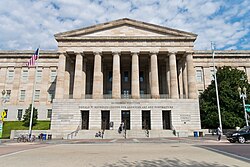| Institution | Course title(s) | Course description(s) | Ref. |
|---|
| Harvard University | The Curious Case of ‘Beyoncé’ the Album | Harvard Business School Marketing Case detailing the under-wraps conception, associated business deals, label meetings, and execution of the surprise release of Beyoncé's Self-Titled album from the perspective of her company Parkwood Entertainment. | [528] |
| Beyoncé Feminism, Rihanna Womanism | Exploration of how the actions of Beyoncé and Rihanna have reflected aspects of black feminism | [529] |
| Introduction to Western Art Music, From Bach to Beyoncé | Introduction to a variety of art music repertories, focusing on the critical roles played by renowned female performers and artists of color | [530] |
| Black Is Queen: The Divine Feminine in Kush | Uses songs from Black Is King (2020) to explore the high status of women in the Nubian Kingdom of Kush | [531] |
| The Lemon Drop | Investigation of the complexities and artistic elements of Lemonade | [532] |
| Yale University | Beyoncé Makes History: Black Radical Tradition History, Culture, Theory & Politics through Music | Examination of Beyoncé's artistic work from 2013 to 2024 as a lens to study Black history, intellectual thought and performance, exploring how she has generated awareness and engagement in social and political ideologies | [533] |
| Cornell University | Beyoncé Nation | An academic study that examined Beyoncé's Southern heritage and the influence of her music on the movement of black feminism. | [534] |
| University of Pennsylvania | Beyoncé, Protest, and Popular Music | A closer look at Beyoncé's career to question how gender and race circulate in contemporary popular music | [535] |
| Family Feuds: Beyoncé, Jay-Z, and Solange and the Meaning of American Music | Taking these artists' albums as a point of departure, this class will focus on the role of popular music as "politics" within contemporary American culture | [536] |
| McMaster University | Beyoncé Studies: Creativity, Celebrity, and Activism | This course takes up the provocations of Beychella, Lemonade, and other musical, performative, and digital work by Beyoncé to examine the debates about creativity, feminism, antiracism, neoliberalism and liberation | [537] |
| University of Houston | Before Cowboy Carter: Black Towns, Black Freedom | Uses Beyoncé's Cowboy Carter as a launching pad to discuss the forgotten Black history of the American West | [538] |
| University of Louisville | Beyond Beyoncé: Communication of an Icon | Study of Beyoncé's impact on modern society | [539] |
| University of Waterloo | Beyoncé Course | Explored Beyoncé's influence and impact, focusing on her 2013 Self-titled album. | [540] |
| University of Victoria | Beyoncé Course | Explored how Beyoncé's music has impacted society. | [541] |
| University of Texas at San Antonio | Black Women, Beyoncé & Popular Culture | Focus on black feminism, female empowerment, and racial tension in the United States. | [542] |
| Rutgers University | Politicizing Beyoncé | Course focused on her artistry and image as an access point for the study of black feminist works on race, gender, and sexuality | [543] |
| University of Tennessee at Chattanooga | Lemonade Week | A curriculum that highlighted discussions surrounding feminism, stage performances, celebrations of African-American women in literature and poetry, along with dance tutorial classes. | [544] |
| University of Arkansas | Beyoncé and Black Feminism | A course that analysed the influence of Black feminism on Beyoncé and Lemonade | [545] |
| Michigan State University | Encompass: A Discussion of Beyonce's Lemonade | Exchanging viewpoints and exploring the lived experiences of underrepresented and marginalized communities. | [546] |
| Chapman University | Beyoncé, Madonna, Nina Simone | This course brings these three artists from different generations together, situating their work historically, within contemporary critical discussions around race/gender/sexuality and cultural appropriation | [547] |
| Chatham University | Lemonade Week | A workshop devoted to Lemonade, allowing learners to explore their relationships with the different power systems that impact their lives. | [548] |
| Texas Christian University | Beyonce and Intersectionality | This honors course uses contemporary music icon Beyoncé Knowles-Carter as a lens to examine academic ideas of intersectionality and black feminist thought | [549] |
| University of North Georgia | Okay, Ladies, Now Let’s Get in Formation: Intersectional Feminism in Beyoncé’s Lemonade | An exploration of intersectional feminism through Beyoncé’s music, lyrics and visuals | [550] |
| Valdosta State University | Black Women in Modern America | A study delving into the diverse themes illustrated in "Lemonade," encompassing aspects of Black identity, feminist perspectives, infidelity in marriage, the bonds of sisterhood, and elements of faith. | [551] |
| Seminole State College of Florida | The Lemonade Reader: Beyoncé, Black Feminism and Spirituality | How Beyoncé embodies the conjure woman in her iconic audiovisual work Lemonade as a contemporary | [552] |
| University of Texas at Austin | Beyoncé in Formation: Remixing Black Feminism | This research examines Beyoncé's visual album, Lemonade, through the lens of Black women's sexuality and gender dynamics. | [553] |
| University of Albany | Lemonade Lessons: Beyoncé’s Feminism and the Art of Visual-Album Storytelling | This initiative fosters classroom discussions and assignments to deepen conversations about Blackness, womanhood, and feminism. | [554] |
| University of Copenhagen | Beyoncé, Gender and Race | A course that explores gender, sexuality, and race, while analyzing the essence of feminism as conveyed through Beyoncé's lyrics, videos, and performances. | [555] |
| ArtCenter College of Design | Pretty Hurts | Exploration of contemporary feminism through the lens of Beyoncé's works | |
| École Normale Supérieure – PSL (ENS Paris) | Beyoncé: nuances of a cultural icon | A seminar aims to examine the challenges posed by Beyoncé's artistic direction through a multidisciplinary lens, integrating aspects of art history, contemporary literature, history, and philosophy. | [556] |
| University of Massachusetts Amherst | Beyoncé: the Myth, the Music, and the Money | This course examines Beyoncé's artistic contributions and life to explore themes of gender, race, class, and identity, addressing broader questions about popular culture, art, and societal context. | [557] |
| Prairie View A&M University | Renaissance-A Queer Syllabus | Academic work that emphasizes LGBTQ+ history and theory, as well as feminism and diversity. | [558] |
| Widener University | Focusing On All Things on Beyoncé | Exploring Beyoncé's influence on African-American culture | [559] |
| Yale University | Beyoncé Makes History: Black Radical Tradition History, Culture, Theory & Politics through Music. | The course analyzes Beyoncé's artistic contributions from 2013 to 2024 as a means to delve into Black history, intellectual discourse, and performance. | [560] |
|

































